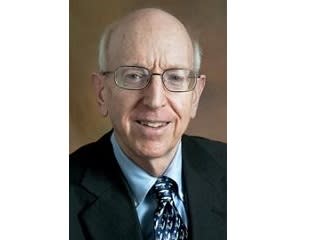The Constitution Outside the Courts: Judge Richard A. Posner
Lyle Denniston looks at remarks from a well-known judge, Richard A. Posner, and their possible influence over the voter ID law controversy.
Judge Richard A. Posner
Today’s Constitution-maker is a well-known judge on a federal appeals court, Richard A. Posner of Chicago—but not for his role on the Seventh Circuit Court. While he often can influence the shape of the Constitution by his work as a judge, he also can do so by his prolific out-of-court writings and public comments. He has done that again, further energizing a lively national debate over requiring voters to prove who they are before they can cast a ballot. In a new book and several interviews and Internet postings, Posner has said he got it wrong six years ago in a decision upholding Indiana’s voter ID law (the same law was later upheld by the Supreme Court).
America, it seems, never tires of debating whether requiring citizens to prove their identities before they may vote is a “good government” method for preventing election fraud or is a partisan effort for keeping minorities and the poor from voting. The debate, in fact, has grown far more intense in the years since a federal appeals court and then the U.S. Supreme Court upheld a voter ID law enacted in Indiana.
Federal and state courts are busy these days hearing and deciding a steadily growing list of challenges to such laws, and the Obama administration’s Justice Department is pursuing an energetic campaign against some of the more restrictive among such laws. The fact that the Supreme Court once upheld the constitutionality of such a law has not ended the courthouse battles.
But the courts are not alone in trying to deal with this issue, and it is easy to get an argument started in virtually any public forum by bringing up the topic. State legislatures are busily engaged, too, and the nation’s pundits and academics continue to try to shape public opinion on the subject—and not always in polite exchanges. In short, there is a robust national conversation now going on about voter ID and its political meaning, and that is bound to have an effect on constitutional discourse.
Judge Richard Posner, in his role as public commentator, has stimulated a whole new round of exchanges on this topic. While pundits and academics have debated whether it was an ethical breach for a judge to thrust himself into the midst of a hotly contested conversation outside his judicial role, and while legal analysts are drawing differing conclusions about the rightness or wrongness of his 2007 decision in the Indiana case, there is constitutional significance in the simple reality that America is talking about this subject in a grand exercise in civic education.
For example: When a conservative columnist wrote on National Review Online that the judge had gotten it right the first time, the article quickly drew 80 comments from readers. For another example, when a New York Times editorial writer did an online post saying Posner’s original opinion in the Indiana case was wrong, 35 readers jumped in with comments.
And, one more example: Retired Supreme Court Justice John Paul Stevens, who wrote the main Supreme Court opinion upholding the Indiana law, gave an interview to The Wall Street Journal sort of taking both sides on the issue: His opinion for the court, he said, was right at the time, but the dissenters have been proven right by history since then.
At the core of this ongoing conversation are several very significant questions: Is voter impersonation a genuine problem of voter fraud or is that a made-up excuse to justify new restrictions on voters? Who is affected by a voter ID requirement, and what impact does it have on those would-be voters? Is this only a partisan issue, because such laws supposedly fall more heavily upon voters who favor Democrats and such laws are always more popular with Republican-controlled legislatures? And, if requiring proof of identity is an idea worth writing into law, are there ways to ease its impact on potential voters who don’t have the more common forms of ID?
Those are serious questions of public policy, and the partisans on either side of the political debate are not the only ones with something at stake. These questions go to the foundation of civic participation in America’s government, and the answers that are or might be found could give new meaning to the right to vote as a constitutional matter.
Having put aside his robe again temporarily, Citizen Posner has lined up with those who now see voter ID laws as “a means of voter suppression,” but doing so did not end the debate, but rather simply gave it a higher visibility. For that, he might actually wind up being a more significant Constitution-maker than when he is on the bench.
Lyle Denniston is the National Constitution Center’s adviser on constitutional literacy. He has reported on the Supreme Court for 55 years, currently covering it for SCOTUSblog, an online clearinghouse of information about the Supreme Court’s work.


